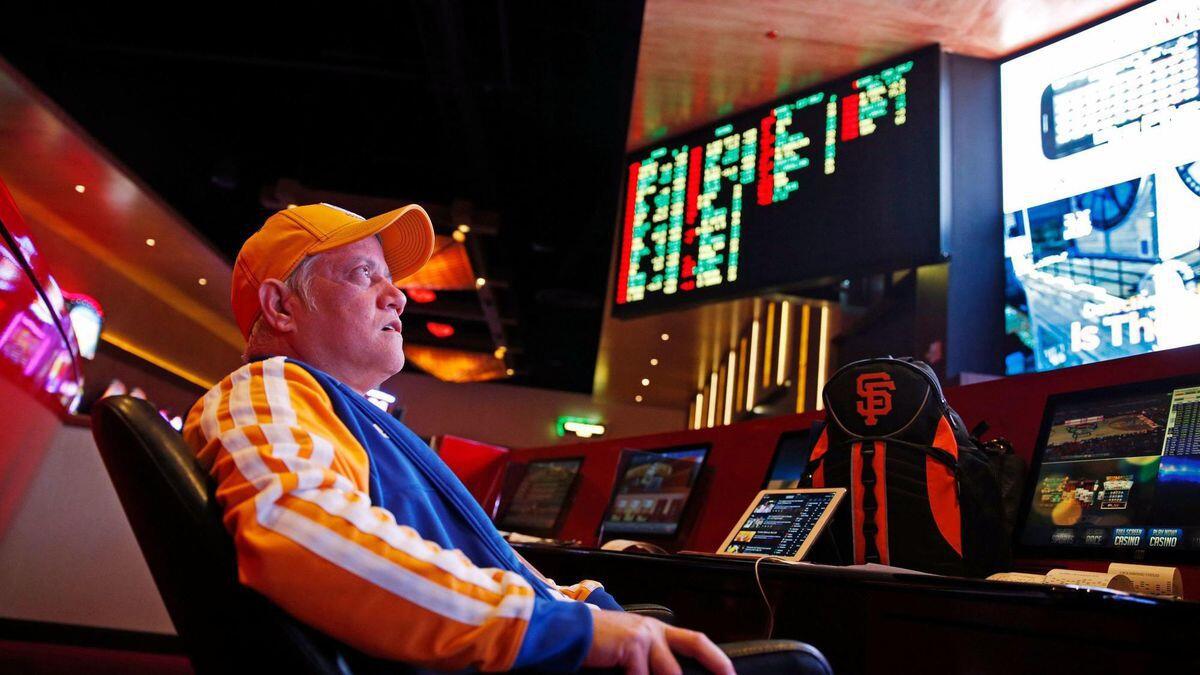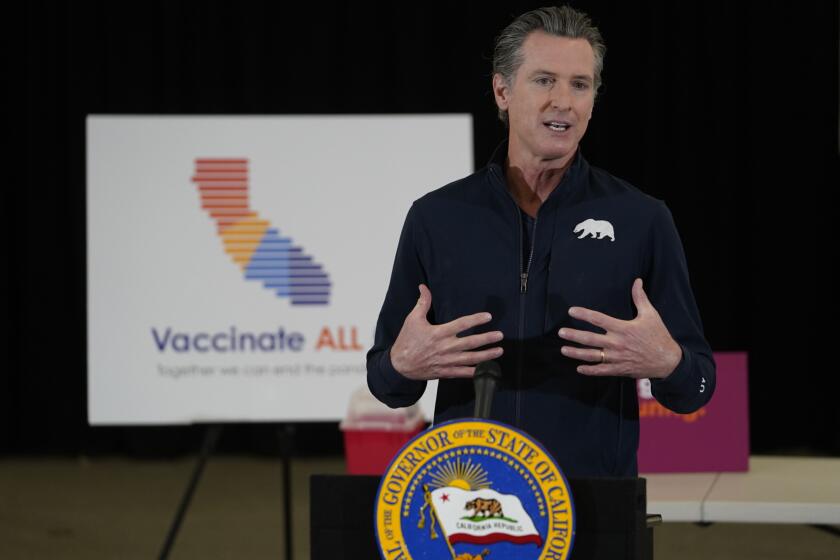California could become America’s sports betting capital as rival groups eye November ballot

SACRAMENTO — Two years after the U.S. Supreme Court removed legal barriers to sports betting, California voters could be asked in November to join 14 other states in allowing legal wagers on athletic contests, creating a lucrative industry worth billions of dollars and intense competition among rival gambling interests in the state.
Last week, a coalition of 18 Native American tribes was given state approval to begin circulating petitions for a statewide ballot initiative that would allow sports betting at tribal casinos and horse racing tracks, but not at rival card clubs or on the internet.
“This is an important step in helping ensure sports wagering is restricted to adults over 21 at highly regulated and experienced locations,” said Mark Macarro, tribal chairman of the Pechanga Band of Luiseño Indians, which operates a casino in Temecula. “The measure will also result in new revenue for mental health programs and vital services like public safety and education.”
Card clubs vowed to campaign against the tribal casino proposal and instead support another ballot measure being considered by the California Legislature that would apply to a larger group of gambling interests.
California voters have given their blessing to legalized gambling three times — first through the creation of a statewide lottery in 1984, then by authorizing tribal casino operations with ballot measures approved in 1998 and 2000.
The stakes are high both for the state and for companies that might be licensed to offer sports betting, said Assemblyman Adam Gray (D-Merced), a leading proponent for legalized sports betting and chairman of the powerful Assembly Governmental Organization Committee.
A legal sports betting market could bring in $2.5 billion in gross revenue annually in California, the largest market in the country, according to Chris Grove, a managing director for Eilers and Krejcik Gaming LLC, a research and consulting firm that has provided estimates to California lawmakers.
The market could generate $250 million to $500 million in tax revenue for the state based on whether the tax rate is 10% or 20%, Gray said.
“It is clear that we are quickly heading in the direction of a well-thought-out, legal sports betting framework here in California,” Gray said at a hearing this month. “We need to create this framework to ensure regulatory oversight and provide consumer protections to get this long-standing and emerging activity out of the shadows of the illicit or black market.”
A national wave of new gambling laws was triggered by a 2018 U.S. Supreme Court decision that struck down a federal prohibition on sports wagering. Betting on football, baseball and other sports is allowed in 14 states, including Nevada, New Jersey and Pennsylvania.
In response to the court decision, Gray and state Sen. Bill Dodd (D-Napa) have each introduced legislation that would put a constitutional amendment on the statewide ballot as early as November to allow sports betting. To make the ballot, lawmakers have until late June to overcome the divisions in the state gambling industry over how to allow sports betting, and groups such as professional sports leagues and law enforcement are already weighing in.
California is home to the most professional sports teams in the nation, including four National Basketball Assn. teams and three National Football League franchises, as well as powerhouse university teams from UCLA and USC. Lawyers for the NBA and Major League Baseball have told lawmakers that they are supportive of the concept of a constitutional amendment but want to make sure any new system protects consumers and the integrity of the games.
“Our view is that sports betting properly regulated can have benefits to bring betting out of the shadows and into the sunlight, to give us tools to allow us to monitor betting on our games and to protect the fans who bet on sports,” said Dan Spillane, senior vice president and assistant general counsel for the NBA, at this month’s hearing at the state Capitol.
Pro league representatives said any system should include consumer protections, including the vetting of operators, age restrictions, gambling addiction programs and requirements that the sports leagues are the sources of data used to set odds and settle bets.
California’s system should also seek to allow betting over the internet and smartphones using state-licensed sites so the legal system can compete and reduce the black market, league officials say.
Because MLB has five teams in California, the most of any state, “it’s really important that California get it right, particularly because this will be the largest betting market in the country and it will be a state that other states look to,” Bryan Seeley, a senior league vice president and deputy general counsel for MLB, told lawmakers this month.
Online gambling can also be lucrative for a state. New Jersey saw some $2.9 billion in sports bets at retail and online sportsbooks in the first year after it began allowing the wagering in June 2018, with 81% of the money wagered online, Grove said.
“It’s clear that if we truly want to take illegal sports betting out of the shadows, there needs to be an online component for those who won’t patronize brick-and-mortar outlets,” Dodd said. “Without that, it will remain largely unregulated, continue to pose the risk of fraud and fail to generate funds for education or help with problem gambling.”
Tribal leaders dispute that mobile betting should be allowed; their initiative would allow betting only at racetracks and at casinos, where patrons might be more likely to participate in other gambling activities as well.
Security and privacy issues have also been cited by opponents of mobile betting.
“Voters have very real and serious concerns about mobile sports betting and would be highly likely to oppose a measure that allows online betting,” said Jacob Mejia, a spokesman for the coalition of tribal casino operators, who added that the tribes don’t rule out allowing online betting in the future.
Legal experts say federal law regarding Native American tribes may be an obstacle to offering internet betting. The proposed initiative would also expand tribal-state compact powers to allow craps and roulette at tribal casinos.
The tribes’ initiative would create a 10% tax on sports gaming revenue at the racetracks, with the state’s share of revenue at the tribal casinos to at least cover regulatory costs subject to negotiations with the governor to amend existing tribal compacts. The measure has a good chance of qualifying for the ballot given the deep pockets of tribal casino operators, who must collect valid signatures from 997,139 registered voters.
This week, seven of the tribes reported they have contributed the first $5.5 million to a new Coalition to Authorize Regulated Sports Wagering, which is handling the petition drive.
The tribes spent $33 million in 2004 to defeat a ballot measure that would have allowed racetracks and card clubs to operate slot machines.
Tribes and their lobbyists also have influence in the legislative process, having cultivated close relationships with lawmakers. Five of the biggest tribal donors pushing the initiative spent a total of $2.1 million on political contributions last year as well as $1.1 million on lobbying state government. On Jan. 16, several tribes co-hosted an annual party welcoming lawmakers back to Sacramento for the legislative year, offering cocktails, gourmet food and a live show by rapper Lil Jon.
The more than 50 non-tribal card clubs represented by the California Gaming Assn. are already gearing up to fight the tribal initiative and weigh in with legislators on the ballot measures proposed by Gray and Dodd, said the association’s president, Kyle Kirkland.
The initiative “gives the sports wagering just to the tribes with no real benefit for California,” Kirkland said, noting that mobile betting would allow residents in cities such as Los Angeles that do not have tribal casinos the ability to gamble without driving long distances.
Florida-based gambling industry attorney Daniel Wallach also has advised lawmakers that they should allow sports betting at sports venues such as Staples Center, home to the Lakers and Clippers basketball teams, if they want the most robust legal market possible.
“You take the activity to where the action is,” Wallach said.
He said he is convinced that the Legislature can legalize sports betting in California without going to the voters to change the state Constitution, but legal experts with the Legislature believe a ballot measure is required.
It will take a two-thirds vote of the Legislature to put a measure on the ballot, and some lawmakers at this month’s first public hearing had concerns and questions about the various proposals. Assemblyman Jim Cooper (D-Elk Grove), a former sheriff’s captain, said he had “a bit of trepidation” about the promise of riches for the state treasury, noting that revenue projections from the legal cannabis industry and lottery have also fallen short of predictions.
The proposals are opposed by the California Coalition Against Gambling Expansion, which is especially concerned about allowing online bets.
“It basically puts a casino in the pocket of every youth potentially and every gambling addict,” said Fred Jones, the group’s attorney. “They don’t have to go anywhere. They have got it right there in their smartphone.”
Dodd, who is chairman of the Senate Governmental Organization Committee, argued that the state and its residents are missing out by keeping betting illegal.
“Though sports betting remains illegal in our state, the fact remains that Californians have and will continue to wager billions of dollars every single year on their favorite sport,” Dodd said. “I for one believe we must bring sports betting out of the shadows in a manner that provides the best deal for the state of California and provides maximum protections for our constituents.”











